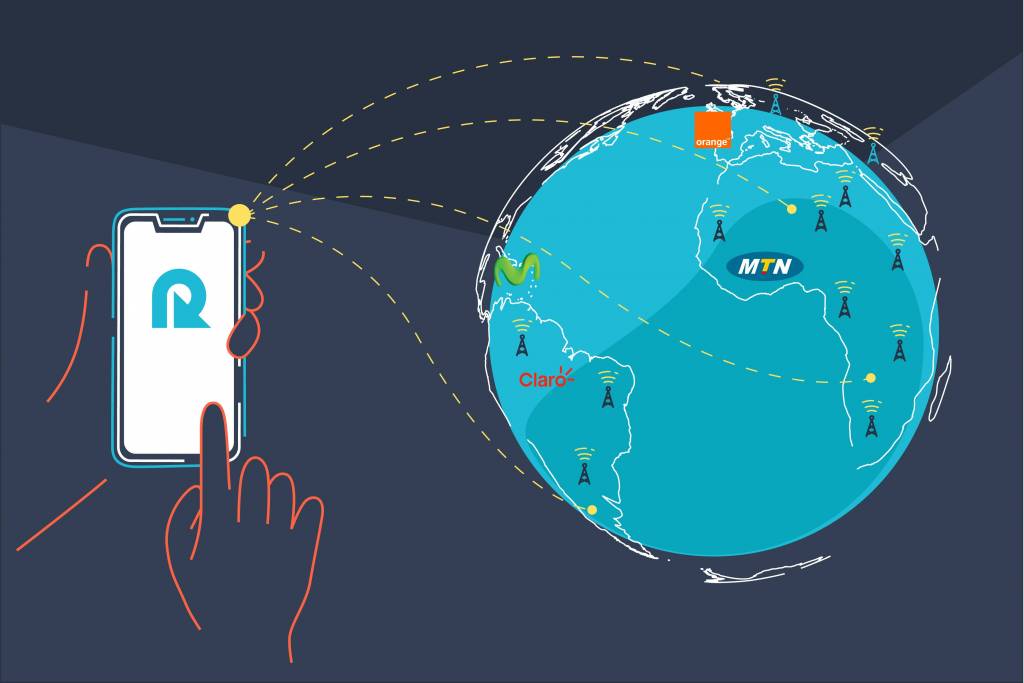Sending airtime in bulk, across the world, and in different currencies used to be “mission mostly impossible.”
But the mobile airtime API changed all of that.
Today, advancements in software in the form of the application programming interface (API) have revolutionized how airtime top-ups, data bundles, and digital goods can be sent across the world.
Mobile airtime APIs act as the glue between you and the world’s mobile operator network.
The software is easy to install, and it provides developers, promoters, and other businesses an easy avenue to interconnect with the software systems that transmit top-ups to billions of mobile phones.
In prepaid-dominated markets in the emerging market, the mobile airtime API becomes a potent new tool for marketing campaigners that are searching for new ways to reach customers.
All of a sudden, we have completely changed how businesses can interact with mobile phones in some of the most remote places on the planet.
This power is democratizing and impacts us all.
For developers, the simplicity of a mobile airtime API provides easy to integrate top-up software for numerous platforms.
For promoters and other businesses, the mobile airtime API is a gateway to mobile operators that was previously only accessible to the coding language-literate.
(Indeed, today there are related airtime applications that can be used with little experience, including this GitHub app that will teach you how to send bulk airtime with zero developer knowledge.)
Learning how to harness a mobile airtime API can have numerous benefits, including:
- Disbursing bulk airtime across geographies and currencies
- Reinforcing customer loyalty programs
- Lowering the cost of acquisition for mobile game users
- Providing an effective tool for promotions, rewards and surveys
However, we have found that many resources on airtime APIs are overly complex — when you can even find a source that provides accurate and up-to-date information.
This is because most of the mobile airtime API industry does offer developer-friendly technology or support.
Here, we’ll provide you with the ultimate guide to understanding how to use a mobile airtime API to best serve your particular use case, no matter your level of understanding.
We’ll cover:
- What is a mobile airtime API?
- What are the main use cases of a mobile airtime API?
- How does a mobile airtime API work?
- How can I make money with a mobile airtime API?
- What do businesses that use mobile airtime APIs say?
What is a mobile airtime API?
Let’s first define airtime.
Airtime are minutes that can be used for overall charges by a mobile provider, including for SMS, internet and voice services.
A mobile airtime API is thus software that helps distribute airtime to mobile phones for these services.
So, what makes a mobile airtime API special?
Thanks to API technology, you’ll be able to communicate with “multiple software intermediaries” — which is a way of saying multiple mobile operators.
The airtime API effectively aggregates all of these telecom systems into one platform, allowing you to disburse bulk airtime, data bundles and digital goods to over 600 mobile operators at the push of a button.
Airtime APIs should be easy to integrate to your own software. This allows you to connect the API — and its vast mobile operator network — to plug and play into your company’s mobile app, website, and other platforms.
Altogether, this gives the user the ability to send mobile top-ups to an astounding 4.5 billion phones.
What are the main use cases of an airtime API?
Using an airtime API is much more than just distributing bulk mobile top-ups.
Today, airtime has been adapted to a range of business models — ranging from fintech applications to marketing incentives for surveys.
Here are a few of the main use cases that Reloadly customers use for our mobile airtime API:
- Remittances: One of the most popular use cases for a mobile airtime API is sending money internationally in the form of remittances. Airtime is increasingly used as money in prepaid-dominated regions such as Africa, South Asia and Latin America. Furthermore, senders are increasingly looking to have control over how their recipients are using the money they send home. This economic and social reality has inspired businesses to develop services around this particular user demand.
- Mobile rewards and incentives: The telecommunications sector is a large user of mobile rewards and incentives as a tactic to help reduce churn. It is thus no surprise that other businesses have caught on to the effectiveness of loyalty-building marketing strategies that involve airtime top-ups as incentives. This is especially visible in the mobile gaming industry, which increasingly uses top-up rewards as a mobile game retention strategy.
- Mobile credit wallets: Airtime being used as money? It’s true. More and more promoters are witnessing a trend to use airtime as a storage of value, making the mobile airtime API more like a fintech than a mobile top-up platform. Where does this happen? Prepaid mobile services still dominate the emerging world, which is home to economies that are prone to high currency volatility. This is especially true in Latin America and Africa, the latter of which has a prepaid-dominated mobile market, with 95% of mobile users on prepaid plans. The volatile nature of local currencies makes holding mobile credit more appealing.
- Survey/research compensation: NGOs and research institutions commonly use airtime as an incentive to have respondents answer surveys and studies. This can be a particularly powerful tool for those carrying out such investigations in the more remote regions of Africa, Latin America and South Asia, where prepaid mobile lines are the only real link to the outside world.
- Cryptocurrency transactions: Mobile airtime APIs like those provided by Reloadly support cryptocurrency by allowing crypto providers the means to accept mobile recharge worldwide payments using a range of cryptocurrency coins. This method mitigates the drawbacks of using crypto because it’s a highly liquid way of using cryptocurrency. On top of which, you earn more profits with your crypto when buying airtime in bulk with the discounts/commissions provided by Reloadly ranging anywhere from 6% to 15% profits. Mobile airtime APIs can also support cryptocurrency by allowing providers to purchase bulk airtime with crypto. This allows you to then process incoming transactions for top-ups.
How does an airtime API work?
Now it’s time for some technical info.
In the case of Reloadly, our mobile airtime API uses a JSON data format.
They are also HTTP-based RESTful APIs that use OAuth 2.0 protocol for authorization.
By using our mobile airtime API, you’ll be able to conduct top-up (airtime) transactions, retrieve account data, view international top-up rates, see your history of transactions and much more, all in one dashboard.
When you create a developer account, Reloadly will generate a set of OAuth client ID and secret credentials for your app for both sandbox and live environments.
In exchange for these credentials, the Reloadly authorization server will issue access tokens — called bearer tokens — that you use for authorization when you make REST API requests.
A bearer token then enables you to complete actions on behalf of, and with the approval of the resource owner.
To learn more about how to set up an airtime API, please see the rest of our authentication documentation.
How can I make money with an airtime API?
Want to turn mobile top-ups into a side business?
By creating a network of resellers, you can use an airtime API to sell mobile top-ups — collecting the difference as profit in the meantime.
The global mobile operator network that is aggregated into a mobile airtime API allows companies like Reloadly to offer discounted rates compared to mobile top-up retailers.
This business can be exciting and profitable, especially in the emerging markets of Africa, Latin America and South Asia.
What’s more, an airtime API makes it easy to organize the multitude of payments associated with such a business.
For example, the Reloadly airtime API provides a dashboard that makes automated calculations for profits. Our dashboard then displays an easy way to retrieve commissions for all operators.
Check out our pricing to review the rates and discounts available by our airtime API.
What do businesses that use airtime APIs say?
A mobile airtime API is not right for every business, but for those that have discovered ways to adopt the use of this software, it can bring extraordinary benefits.
Furthermore, mobile airtime APIs — as all things tech — have been continuously updated, year after year.
We have found that the businesses that use Reloadly’s airtime API are particularly looking for not just new technology, but also new business models.
For example, Julaya is a mobile payment app that is based in the Ivory Coast.
In search of a better mobile top-up API provider, Julaya found that Reloadly did not have any restrictions or pre-requisites to register for an account. In Africa, where they were used to lengthy or complicated contractual terms, this was a deal-breaker.
“Having integrated local and international solutions for airtime top-ups, I can say that Reloadly has the fastest and easiest onboarding process,” said Mathias Leopoldie, CEO of Julaya.
“Their API is really well documented and works seamlessly.
Bonus: customer service is really reactive so you won’t get stalled.”
In industries like cryptocurrency, the use of more nimble airtime APIs is also being welcomed.
“The Reloadly top-up API service is like the missing gem our developers always wanted — a universal resource to connect with mobile operators worldwide, free of contracts, always on, pay as you go,” says Elvis Morales, Founder and CEO of CryptoRecarga.
“Their fast support response and well-documented API has enabled us to develop the core functionality of CryptoRecarga.”
Final thoughts
Looking to learn more about how mobile airtime APIs can help your business? Contact the Reloadly team and we’ll get you linked up with the world’s mobile operator network in no time.



